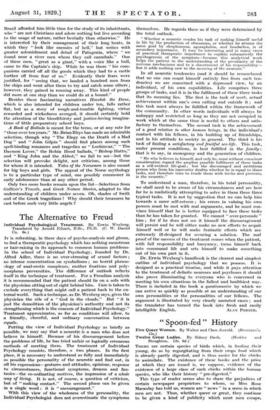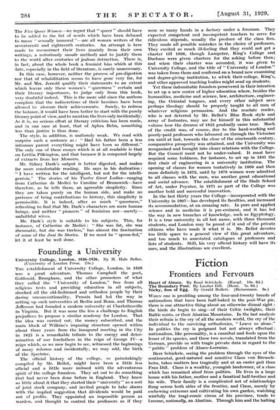" Spoon-fed " History
THERE are certain species of birds which, in feeding their young, do so by regurgitating from their crops food which is already partly digested, and is thus easier for the chicks to assimilate. The existence of these books and the price at which they are issued is, we suppose, evidence of the existence of a large class of such chicks within the human species, who like their history "pre-digested."
This type of reader seems also to share the prejudices of certain newspaper proprietors to whom, so Miss Rose Macaulay has told us, women are " news " in a sense in which men arc not. Thus, whether queer or great, they continue to be given a kind of publicity which most men escape.
The Fire Queer Women—we regret that " queer " should have to be added to the list of words which have been debased to mean sexually immoral "—are all women writers of the seventeenth and eighteenth 'centuries. An attempt is here made to reconstruct their lives (mainly from their own writings, a notoriously unsafe method) and to justify them to the world after centuries of jealous detraction. There is, in fact, about the whole book a feminist bias which at this date, especially in the field of literature, is surely unnecessary.
In this case, however, neither the process of pre-digestion nor that of rehabilitation seems to have gone very far, for Mr. and Mrs. Jerrold qualify their statements to an extent which leaves only these women's " queerness " certain and their literary importance, to judge only from this book, very doubtful indeed. This is the more odd since the authors complain that the indiscretions of their heroines have been allowed to obscure their achievements. Surely, to redress the balance, it would have been better to start with the purely literary point of view, and to mention the lives only incidentally. As it is, no serious effort at literary criticism has been made, and in one case at least, that of Aphra Behn, something less than justice is thus done.
The style, in addition, is uniformly weak. We read with surprise such a sentence as : "Had his father been a less inhuman parent everything might have been so different." The only one of these essays which is at all readable is that on Letitia Pilkington, and that because it is composed largely Of extracts from her Memoirs.
Mr. Sidney Dark's output is better digested, and makes far more comfortable reading. He says in his dedication : "I have written for the intelligent, but not for the intelli- gentsia." The stories of his Twelve Great Ladies—ranging from Catherine de Medici to Caroline of Brunswick—have therefore, as he tells them, an agreeable simplicity. Since they are taken purely on the human side, and make no pretence of being contributions to history, this simplicity is permissible. It is indeed, after so much "queerness," refreshing to find that Mr. Dark's characters are mere human beings, and neither " pioneers " of feminism nor—merely- unfaithful wives.
Mr. Dark's style is suitable to his subjects. This, for instance, of Catherine de Medici : "She was fat, she was rheumatic, but she was tireless," has almost the fascination of some of the Just So Stories. If we must be "spoon-fed," let it at least be well done.

































 Previous page
Previous page